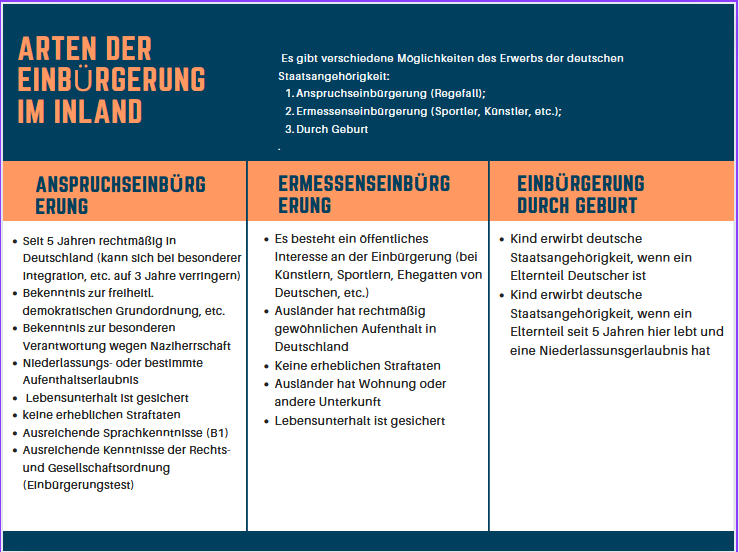Higher Administrative Court of Hesse, Judgment of November 21, 2017, Case No.: 5 A 2126/16
According to § 11 paragraph 1 of the Nationality Act (StAG), naturalization is excluded if there are actual indications that justify the assumption that the foreigner is pursuing or supporting, or has pursued or supported, efforts aimed against the free democratic basic order, the existence or security of the Federation or a state, or has aimed at an unlawful impairment of the duties of the constitutional organs of the Federation or a state or their members, or that threaten foreign interests of the Federal Republic of Germany through the use of violence or preparations for violence, unless the foreigner credibly proves that they have turned away from such efforts or if there is a particularly serious deportation interest according to § 54 paragraph 1 No. 2 or 4 of the Residence Act (AufenthG). It must be noted that adherence to the free democratic basic order is a mandatory requirement for naturalization. At the time of naturalization, it must be evident that the foreigner respects fundamental values. If the foreigner has openly displayed anti-constitutional sentiments before naturalization, it is necessary for them to demonstrate that they have renounced these sentiments, thereby showing that they have changed their inner attitude.
The following judgment addresses the conditions under which support actions are assumed and when actual indications under § 11 paragraph 1 No. 1 StAG are considered to exist.
Facts of the Case:
The defendant, the authority, appealed to the Higher Administrative Court of Hesse against the judgment of the Gießen Administrative Court, which had overturned the rejection of the plaintiff’s naturalization and had ordered the authority to naturalize the plaintiff.
The plaintiff, a stateless Palestinian, entered Germany in 1994 and later received a residence permit. In 2011, he applied for naturalization. The authority rejected the application due to doubts about his loyalty to the constitution. The plaintiff had stated that he was a member of the Council of Imams and Scholars (RIG) and was chairman of the Islamic Community X-Stadt e. V. He was also alleged to have ties to the Muslim Brotherhood (MB).
The Administrative Court overturned the rejection and ordered the authority to naturalize the plaintiff, arguing that there was insufficient evidence of the plaintiff’s anti-constitutional activities.
First Instance Considered the Plaintiff Loyal to the Constitution
The Gießen Administrative Court found no evidence of the plaintiff’s anti-constitutional behavior. The plaintiff had acknowledged the German constitutional order and described his activities as purely religious. He led a discreet life, had no criminal record, and was married to a German citizen.
The Authority Applied for Admission of the Appeal
The Higher Administrative Court of Hesse admitted the appeal at the authority’s request. The authority argued that the Administrative Court had incorrectly assessed the plaintiff’s connections to anti-constitutional organizations.
Decision of the Higher Administrative Court of Hesse
The appeal was admissible and justified. The Higher Administrative Court overturned the judgment of the Gießen Administrative Court and denied the plaintiff’s naturalization because the exclusion ground of § 11 sentence 1 No. 1 StAG was present. This provision excludes naturalization if there are indications that the foreigner supports or has supported anti-constitutional activities.
Plaintiff Supported Islamist Anti-Constitutional Organizations
The plaintiff was found to have verifiable contacts with anti-constitutional organizations such as the IGD, the RIG, and the MB. These organizations seek an Islamic rule incompatible with democratic principles. The plaintiff’s activities, such as translating content and participating in events, were deemed to support these efforts.
No Distinction Could Be Made Between the Plaintiff’s Internal Attitude and His Outwardly Expressed Distancing from the RIG
The Higher Administrative Court found that the plaintiff had not credibly distanced himself from the anti-constitutional activities of the organizations. His statements were considered mere protective claims. Since the plaintiff did not credibly demonstrate a break from his support, naturalization was to be denied.
Based on these considerations, the appeal was upheld, and the plaintiff’s naturalization was rejected.

Source: Higher Administrative Court of Hesse
Important Note: The content of this article has been prepared to the best of our knowledge and belief. However, due to the complexity and constant evolution of the subject matter, we must exclude liability and warranty. Important Notice: The content of this article has been created to the best of our knowledge and understanding. However, due to the complexity and constant changes in the subject matter, we must exclude any liability and warranty.
If you need legal advice, please feel free to call us at 0221 - 80187670 or send us an email to info@mth-partner.de
Lawyers in Cologne advise and represent clients nationwide in immigration law.


